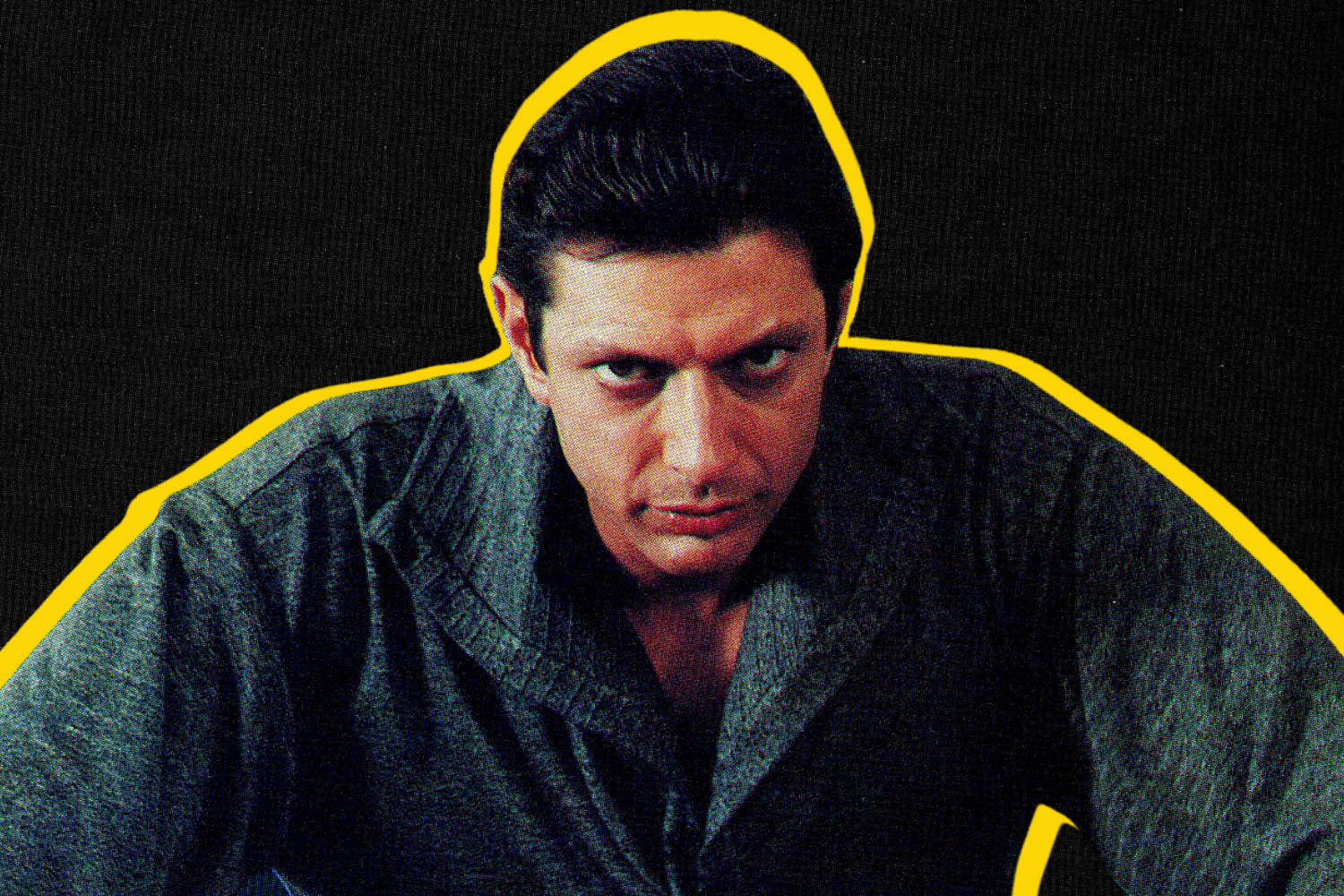Editorials
‘Mister Frost’ Offers No Sympathy for the Devil
June 11th, 2021 | By Rob Hunter

Acting, almost by its very definition, is the art of bringing someone other than yourself to life for an audience. The best actors do so while leaving themselves behind, meaning viewers see more of the character and less of the performer. That said, you can’t help but see some greats like late career Jack Nicholson, Samuel L. Jackson, and Eddie Deezen in nearly every role they play. Jeff Goldblum belongs in that latter group as an actor whose personality and precise quirkiness is almost inevitably present regardless of the character. It’s usually an obvious fit with the material, but 1990’s deadly serious slowburn Mister Frost sees Goldblum deploy those charms in an unexpected direction—as a serial killer who just might be the devil himself.
Goldblum’s quirks can sometimes feel at odds with both the character and tone of the film, and indeed, critics at the time harped on that very point. Roger Ebert said in his review that the actor’s mannerisms made him the “least likable” Satan in cinema history (of course, Ebert also hated 1986’s The Hitcher so much that he spoiled its ending on The Tonight Show, so whatever.) By contrast, it’s actually those same mannerisms and delivery quirks that make Frost so damn charismatic to those who cross his path.
Mister Frost’s genre answer for his Svengali-like pull and power arguably comes down to Frost being Satan, but the truth could just as easily rest in one psychotic man’s acting ability. Frost is a proven, admitted murderer, but what if his claim that he’s the devil is merely a ruse? One designed to lull people in only to unnerve them with doubt and uncertainty? And one aided and abetted by Goldblum’s looks, traits, and uniquely captivating dialogue delivery?
But first, a quick plot synopsis for those who haven’t seen Philippe Setbon’s Mister Frost, which in keeping with the Certified Forgotten bylaws is most of you as the film is unavailable to stream and has never been released to disc.
Two thieves break into a remote estate and find a dead man within. Det. Felix Detweiler (Alan Bates) arrives later to investigate the claim and is greeted by a polite, soft-spoken man filling in a body-sized hole in the backyard. Mr. Frost (Goldblum) invites the detective inside for tea and dessert, but when Detweiler declines, Frost merely takes a Polaroid photo of the Baked Alaska before dropping the food into the trash. “I’m only interested in the trophy,” he tells the increasingly suspicious detective who arrests him on the spot for the future crime of inventing Instagram. That’s a fib, but he does arrest Frost for the twenty-four bodies found around the estate consisting of two dozen men, women, and children who were brutally tortured and murdered.
Two years later Frost arrives at a mental hospital—his identity has never been discovered, and he hasn’t spoken a word since his arrest despite the best efforts of doctors hoping to crack a high profile murderer. The staff greets him like an esteemed guest, but he only has dark eyes for Dr. Sarah Day (Kathy Baker). He speaks, to everyone’s surprise, but he does so only with her, and the two soon develop a dangerous rapport.
Frost claims circuitously to be the devil, and his end game is simple—he wants Day, a well-respected champion of science, to give in to fear and faith and see no other option but to kill him.
As mentioned above, Mister Frost plays it a bit cheeky with the confirmation that Frost is indeed the devil in human form. Its final moments seem to say as much, but it could just as easily be a commentary on the infectious nature of shared madness—with the belief in gods and devils being a particular target. Frost moves among the hospital staff and patients alike while whispers as to his identity leave a heaviness in the air. Erratic patients calm at his touch, educated doctors see their doubts and insecurities magnify leading to assault and attempted suicide, and one “cured” young man returns home to murder his own father before setting his rifle sights on priests and rabbis. Frost’s presence is his power, and his nudges both spoken and otherwise leave people in mental disarray. “If we think he’s the devil,” says one observer, “then the devil he will be.”
Detweiler even refers to Frost as “the devil himself” in a nod to 1978’s Halloween, but unlike Michael Myers, this devil has words to support his evil actions. “I’m darkness, I’m the prince…I am memory,” he tells Day, adding ”I’m the gagaman. Boo.” It sounds silly on the page, but Goldblum’s tall frame, piercing gaze, and uniquely staccato delivery leaves each utterance landing with a confounding blend of menace and whimsy. Frost is a murderer, but Goldblum’s insidious charisma makes it easy to see how people fall under his spell. He’s oddly endearing, and the desire to appease him—or to acknowledge his existence through violence—becomes more understandable than it would had Frost been played by a more “typical” actor simply layering on evil undertones.
While the rest are easy marks, it’s Dr. Day who Frost wants to seduce the most. She’s bull-headed and unafraid from the outset, and the more he throws her way the more she resists. Her rational defenses begin to crumble when her brother—a person who uses a wheelchair—begins to walk again, with Frost adding only that the devil too works in mysterious ways. A wavering Day asks what he hopes to accomplish here, and he makes it clear that he’s after nothing less than revealing to the world the impotence of science.
“It used to be simple, good on one hand, evil on the other. There was a struggle, we had a game, and yes, we made it up, but then you came along. The scientists, the geniuses, you couldn’t care less about the human spirit. There was a time that people sold their souls to me for youth, for wealth. You think you don’t need Mr. Frost, but where’s your enthusiasm? There’s no passion, there’s no life.”
In a world where knowledge is replacing faith, Frost wants a return to the good old days, and both his argument and claimed identity seem sound. Mister Frost leans in on the latter ensuring the character appears to know more than he should, leaving authorities befuddled as they find no record of him before his arrest, surrounding him with medical miracles and outbursts of madness, and having Day speak in his voice after killing him. No, really. That’s admittedly a big one. Before she fires he says he’s stronger than all of man’s knowledge, and moments later as she stands in a daze over his corpse, she utters “Stronger than passing time” in Goldblum’s voice.
Compelling, perhaps, but it could also simply be a stylistic choice in Mister Frost as a moment that’s otherwise sandwiched by coincidences and parlor tricks. She’s done his bidding out of fear and faith, and the words may simply symbolize that her choice is now continuing his legacy. Perhaps more telling is an earlier scene where Frost’s possible charade cracks for the one and only time. It’s as Day presses him on her belief that he’s merely pretending—acting—like he’s the devil, and is instead no more impressive than the evils that men do every day all around the world. “Goddammit,” he yells, “Why do you talk so much?!” It’s a momentary outburst and lapse in control, and Goldblum’s very human reaction sells the break as volatile and dangerous. After quickly recovering his poise, though, he adds calmly that “Speech might have been my greatest invention.” Frost says he knows what words can conceal, but they unavoidably reveal quite a bit as well.
Mister Frost ends with Day arrested and exiting the hospital lit from behind, her blond hair taking on a halo-like glow around her head, and we’re left to wonder if the dark fallen angel has been struck down by an avenging sibling—or is it just a trick of the light? Did she snap or has the devil jumped into her now (predating 1998’s Fallen)? Interestingly, an alternate ending shows Day in an interrogation room, silent and unmoving aside from a quick grasp into the air as she grabs a fly mid-flight. Flies are no strangers in the presence of the devil, but here—Frost himself plucks one from the air earlier in the film and listens to its buzz—it’s another reminder of Goldblum’s presence. His biggest hit to this point was 1986’s The Fly, after all.
Is he the devil? Mister Frost concludes without a definitive answer, but casting Goldblum in the role ensures either argument is equally valid. Both character and actor are as smart, seductive, and weirdly charismatic as you’d expect the devil to be. It’s ultimately Goldblum’s alluring oddness that ensures the faithful and faithless alike would happily follow him to hell and back.
Visit our Editorials page for more articles like this. Ready to support more original horror criticism? Join the Certified Forgotten Patreon community today.

